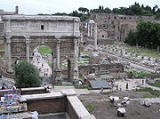
Cato the Elder
Overview
Ancient Rome
Ancient Rome was a thriving civilization that grew on the Italian Peninsula as early as the 8th century BC. Located along the Mediterranean Sea and centered on the city of Rome, it expanded to one of the largest empires in the ancient world....
statesman, commonly referred to as Censorius (the Censor), Sapiens (the Wise), Priscus (the Ancient), or Major, Cato the Elder, or Cato the Censor, to distinguish him from his great-grandson, Cato the Younger
Cato the Younger
Marcus Porcius Cato Uticensis , commonly known as Cato the Younger to distinguish him from his great-grandfather , was a politician and statesman in the late Roman Republic, and a follower of the Stoic philosophy...
.
He came of an ancient Plebeian
Plebs
The plebs was the general body of free land-owning Roman citizens in Ancient Rome. They were distinct from the higher order of the patricians. A member of the plebs was known as a plebeian...
family who all were noted for some military service but not for the discharge of the higher civil offices.
Quotations
Wise men learn more from fools than fools from the wise.![]()
Plutarch's Life of Cato Variant: Wise men profit more from fools than fools from wise men; for the wise men shun the mistakes of fools, but fools do not imitate the successes of the wise.
The best way to keep good acts in memory is to refresh them with new.![]()
Apothegms (no. 247)
Emas non quod opus est, sed quod necesse est. Quod non opus est, asse carum est.![]()
Buy not what you want, but what you have need of; what you do not want is dear at a farthing.

